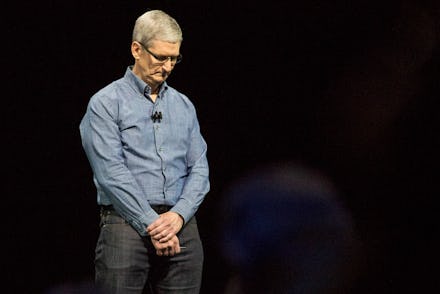Apple's $15B EU tax bill: Will it hurt the company?

Ireland granted illegal tax benefits to U.S. technology giant Apple from 2003 to 2014 in exchange for moving jobs to the country, according to a new ruling from the European Commission's anti-trust regulators.
To make up for it, the European Commission, the EU's governing body, now wants Apple to pay 13 billion euros, or nearly $15 billion, in taxes — plus interest.
For what it's worth, Ireland wants nothing to do with the cash: "The decision leaves me with no choice but to seek cabinet approval to appeal," Irish Finance Minister Michael Noonan said in a statement to Reuters.
It's a huge bill.
The largest previous recovery decision concerned the German racetrack Nurburgring and was only 1.3 billion euros, a spokesman for the European Commission confirmed in an email to Mic.
As Business Insider pointed out, that's nearly double what Apple made on its last quarterly profit, and enough money to buy five iPhones for every Irish man, woman and child.
On the flip side, Apple is not really a "normal company," said Howard Silverblatt, a senior analyst with S&P Dow Jones Indices, explaining that this was one of the few companies on earth that could afford such a bill.
"You never sue anyone without money," he said, going on to call the potential settlement a "feasible, reasonable amount."
Even if Apple ends up having to pay the full settlement, that would still only amount to about 6% of the company's cash on hand, Silverblatt said.
There are also political forces at play, with European countries fighting to claim tax revenue from the world's richest companies.
Google has been a frequent target of EU anti-trust authorities, and Amazon, Starbucks, and McDonalds are all under investigation as well.
Just last week, Uncle Sam clapped back: The Treasury Department published a white paper arguing that the European Commission was overreaching, and that the department was considering ominous-sounding (if vague) "potential responses" if the inquiries continued.
But it seems unlikely that the EU will back down.
What the Commission will have to prove is whether Ireland did — in fact — give Apple a special deal, or whether the country, which has long had an extremely low corporate tax rate, has effectively given a similar arrangement to all companies.
"This is inning one or two in a nine inning ball game," said Angelo Zino, an equities analyst who covers Apple for S&P Dow Jones. He explained that there will likely be a lengthy appeals process, possibly resulting in a reduced settlement for Apple.
How this situation plays out could have ramifications for all American companies with operations in Europe, but so far it doesn't seem to have shaken investors' confidence in Apple all that much.
Apple stock was only down 0.7% as of 12:03 p.m. Eastern, not much more than the 0.2% dip taken by the S&P 500, an index of the 500 largest U.S. companies, a bellwether for the broad stock market.
Of far greater importance to Apple, Silverblatt explained, is its upcoming announcement on September 7th when it will present the latest iPhone.
Apple was able to beat expectations this past July, the most recent time it announced its earnings — but before that, the stock had fallen 20% over the previous year.
If the company is pulling its punches for a major rollout of the iPhone 8 — which will happen in 2017 on the iPhone's 10th anniversary — the iPhone 7 this September might not be much to write home about.
Representatives from Apple didn't respond to requests for comment by press time.
August 30th, 2016, 3:18 p.m.: This story has been updated to reflect that the largest previous recovery decision was 1.3 billion euros, per a spokesman from the European Commission.